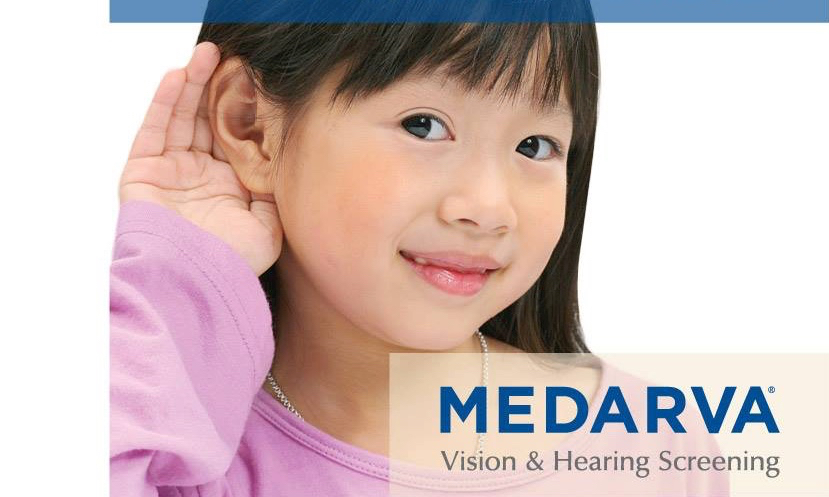MEDARVA Healthcare has spent the past seven years investing in and conducting early childhood vision and hearing screenings. In that time, 19 percent of children have failed one or both of the two screenings. Across all socioeconomic classes, kids are at risk of falling behind in school and life because of a simple missed diagnosis.
Before someone labels your child, you should know that there might be a reason why: problems with their vision or hearing.

Good vision and good hearing are key to a child’s success. A child’s eyes and ears are constantly in use in the classroom and at play. Experts estimate that as much as 80 percent of the learning a child does occurs through his or her eyes. Reading, writing, whiteboard work, and using computers are among the visual tasks students perform daily. When a child’s vision or hearing is not functioning properly, learning, social development, and participation in sports can suffer.
Our research shows that children only know what they have experienced. Therefore, fuzzy letters, words or even faces may not seem strange to them because that’s all they know. A child who has a difficult time hearing may struggle in class and may feel socially isolated. Sometimes parents and teachers may feel that their child has tuned them out, when in reality, something may be preventing the child from hearing clearly.
“Sometimes it is easy for parents to misdiagnose what is actually going on with their child,” said Matthew Bridges, MD, of Commonwealth ENT. “Whenever there is a significant change in your child’s behavior, it is good practice to go see your pediatrician or even an ENT to determine if there is an underlying problem.”
Finding and treating eye problems such as blurry vision, amblyopia (lazy eye), and strabismus (crossed eyes) at an early age may have a significant impact on improving a child’s success in school and can often be treated effectively with early detection. Early treatment of hearing problems also leads to better outcomes for the child. In some cases, if the vision or hearing problem is not identified and corrected early enough, permanent damage may result.
“Vision screenings are incredibly important for preschool aged children because the eye is still developing through early childhood and young children cannot tell their parents that something is wrong,” said Matthew Doerr, MD, pediatric ophthalmologist at Virginia Pediatric Ophthalmology Specialists. “The timing of the program is also key because it can identify the need for glasses or treatment of amblyopia and strabismus when these issues can be successfully treated.”
A child’s vision can change dramatically in a short time. A local family had a complete eye exam conducted for their 3-year-old, Shelly. The exam showed normal vision. Two years later, she failed the vision screening just before starting kindergarten.
“We had no idea her eyes could have changed so quickly,” Shelly’s mom said. “We were concerned that something major could potentially be wrong, but it turned out she was just farsighted and required glasses for reading and working on a computer. She never said anything was wrong because she never knew anything was drastically different.”
MEDARVA’s program differs from others around Richmond because it provides recommended doctor referrals for vision or the hearing tests it conducts, making it easy for parents to select a doctor in their area and schedule a follow-up examination.
One teacher recently commented on her student’s interaction in class once she received glasses from a doctor following a referral from MEDARVA. “She would sit alone and wouldn’t talk a lot with the other students. Now she is more confident. She answers questions and is eager to join the group and sit in the front so that she can participate.”
A recent study from the University of Michigan found that a number of ADHD cases had actually been the results of missed sleep apnea diagnoses. Because the children in the study were not getting enough sleep, their brains were making up for it by becoming overactive the next day – trying to stay awake by overcompensating. This was labeled as ADHD and the kids were put on unnecessary medications.
LEARN MORE ABOUT MEDARVA VISION & HEARING SCREENING PROGRAM.
Signs of Vision and Hearing Issues
Because vision and hearing may change frequently during the school years, regular medical exams are important. You and your child’s teachers should watch for clues that your child’s vision or hearing may be changing, even if the changes are subtle.
Signs that may indicate a child has a vision or hearing problem include:
- Frequent eye rubbing or blinking
- Avoiding reading and other close activities
- Frequent headaches
- Covering one eye
- Tilting or turning the head to one side
- Holding reading materials close to the face
- An eye turning in or out
- Seeing double
- Losing place when reading
- Difficulty remembering what he or she read
- Attempt to do work, but with a lower level of comprehension
- Experience discomfort and fatigue
- Has a short attention span
- Asking to repeat things that have been said
- Turning volume up on electronic devices
- Difficulty pronouncing words
All of these are just examples. There are other signs that a medical professional can discuss with you as your child grows.
(This content was supplied by MEDARVA)







